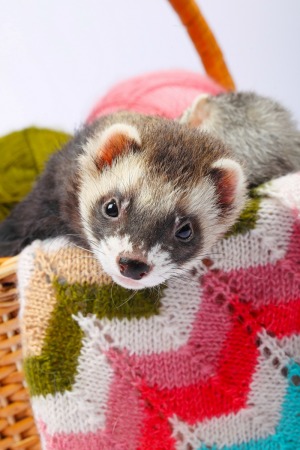
 The ferret was domesticated several thousand years ago to help hunters ferret out rabbits and small rodents from their underground lairs. They are the third most popular companion animal behind dogs and cats. Although these playful, cuddly creatures are easy to fall in love with, keeping one as a pet is not a decision to make impulsively.
The ferret was domesticated several thousand years ago to help hunters ferret out rabbits and small rodents from their underground lairs. They are the third most popular companion animal behind dogs and cats. Although these playful, cuddly creatures are easy to fall in love with, keeping one as a pet is not a decision to make impulsively.
Are You Ready for a Ferret?
Like all pet ownership, keeping a ferret comes with costs both financially and in terms of your lifestyle. Although many people find them to be wonderful pets, they certainly aren't for everyone. A ferret's lifespan is 6 to 10 years, so your choice to keep one as a pet needs to be carefully researched and preparations made ahead of time before you bring a ferret home. Many people are surprised at just how much of a commitment is necessary to keep a ferret healthy and happy.
Financial Commitment
Veterinary care ($200-$300+ annually): Similar to dogs and cats, ferrets need regular veterinary care, including spay/neutering, routine vaccines, heartworm prevention, wellness check-ups, and care for unexpected illnesses.
Pet supplies (cost of initial supplies, then $400-$600 annually): This includes access to high quality food and treats, a cozy, well-appointed habitat, and a host of other miscellaneous items such as bedding, food and water dishes, toys, grooming products, litter box, etc.
Lifestyle Commitment
Time: Because ferrets are such highly social animals, they also need plenty of interaction with both humans and other ferrets to remain healthy. Ideally, this means four or more hours out of their cages each day for social interaction and supervised play. In addition, you must also be willing to set aside time for training and daily tasks like feeding, grooming, and litter changes.
Changes to your household: Ferrets are curious, intelligent creatures, which can lead them into dangerous situations in your home. They will climb on things, get into things, get out of things, and get under things. In order to provide them with a safe environment, you will need to ferret-proof your home. This means deciding where your ferret will be allowed to roam (while supervised) and getting down to ferret level to make sure that there is nothing harmful or dangerous they can get into.
Finding a Veterinarian
A good ferret veterinarian is important for helping your pet lead a long and healthy life. Ferrets require regular vaccinations against rabies and distemper. Young ferrets (also called kits) need a series of canine distemper shots two to three weeks apart. Since most are sold only with their first shot, its important to schedule a visit with your veterinarian as soon as possible after bringing your ferret kit home to arrange a vaccination schedule. If you are adopting an older ferret and are uncertain of its vaccination history, your veterinarian may recommend booster shots. A veterinarian experienced in caring for ferrets will also be able to show you techniques for proper cleaning, nail clipping, and dental care and answer any other questions you may have about keeping your ferret healthy.
To find a veterinarian experienced in ferret care, ask for recommendations from the breeder or shelter where you purchased your ferret. You can also find a list of veterinarians who specialize in ferret care by state from The Association of Exotic Mammal Veterinarians (see link below).
Encouraging Litter Box Training
With a little patience and effort on your part, most ferrets can be trained to use a litter box. Use the fact that ferrets don't like to go where they eat, sleep, and play to your advantage. Like many animals, ferrets have a natural tendency to go where they've gone before. Encourage them to use a litter box by placing one in a corner of their cage and in each of the rooms they are allowed to play in (once they decide they have to go, they don't like to travel far). Discourage them from going in the wrong places by putting down food bowls, blankets, or toys in the area.
Controlling Unpleasant Odors
Ferrets are generally clean by nature, but they do emit a musky odor especially males and females who are left intact. They should be bathed when they get dirty, but bathing them too often will cause them to release even more of their natural oils. Although you can never get rid of a ferret's natural musky smell entirely, keeping their bedding and litter boxes clean will go a long way to minimize unpleasant odors.
Training, Exercise, and Socialization
Ferrets are active animals, and they love to socialize and play. Boredom tends to lead to stress, which can lead to destructive behavior. The amount of daily exercise a ferret needs depends on the age and health of the individual ferret. During their most active years, ferrets need exercise and mental stimulation for a minimum of several hours each day.
Ferrets, especially kits, play with each other by mock combat which includes nipping and biting. It is your responsibility to teach them that nipping humans during play is unacceptable. Ferrets are smart animals and will learn proper play if you work gently with them and make your expectations clear. Mother ferrets discipline their babies by grabbing the scruff of their neck. You can do this, too. For example, if your ferret starts to nip you, grab him gently by the scruff of his neck and give him a firm "no". You can also try offering him lickable treats from your hand, or redirecting him to some toys.
If you're willing and able to make the commitment and to accept both the challenges and the rewards of caring for this unique animal, keeping a ferret as a pet can be a very satisfying experience.
Source: American Ferret Association (Http://www.ferret.org/links/vets.html )
Link: http://www.aemv.org
Add your voice! Click below to comment. ThriftyFun is powered by your wisdom!
We have a ferret that we rescued from someone who rescued it from someone who couldn't keep it.
I just bought a new cage for it last month, it has three levels and I put a lot of boxes and two hammocks in it. I like to give the ferret, Tinker, lots of room to crawl and snuggle. We let her out and play in our bedroom.
My Tinker is one of the ones that do not use a litter box.
It is beyond fruitless to try to get her too, it is beyond her scope of learning. We accept her as she is.
When she first came to us, she was very bad at nipping, but she eventually got over that. I made a kind of mistake one season, by taking her and putting her up in her house, which is where she probably wanted to go eac h time she bit. She learned to bite to be put up. She is gently scruffed now when she bites, and that relaxes her while I softly talk to her. My husband holds her little butt and her scruffed neck while I gently trim her nails. She is a joy to us. She does have one habit which is rather annoying, which they all do..she hides things in a stash, and her particular go to item is shoes.
Way behind the bed they go, and she pushed them into corners. I have to "ferret" them out several times a year.
I gave her her own room for a while, thinking she would be happier that way. She wasn't to my surprise. So I spent about one hundred and thirty dollars on a cage from amazon.com and made it fun to be in.
I like to compare the protein content of any cat food I buy with the ferret food at the local grocery. If the ferret food is lower in protein than I buy the kitten chow.
Anyway, most ferrets you will find, they have two dots on their ears. Those dots are tattoos. They mean the ferret has come from Marshall Ferrets. The one dot is for having been altered, either by spaying or neutering, and the other is for having been descented. Those two dots on the inside of their ear flap tell you the surgeries have been done and that they are Marshall Ferrets.
Do not put a really young ferret with an adult ferret as the young ferret can make the adult sick.
Oh, and another thing, they are smart. When they are loose and they hear the door opening, or the alarm bell go off, to let you know the door is open, out they will go in search of the nearest adventure, many times near water. They will not return like a cat would or a dog might.
They are great to have as long as you don't keep them in their cages which are filthy but clean the cage out.
They are just so funny, like otters, jumping and doing pratfalls off the bed for laughs...Oh and don't laugh at any bad behavior...that will set the behavior in stone.
Add your voice! Click below to comment. ThriftyFun is powered by your wisdom!